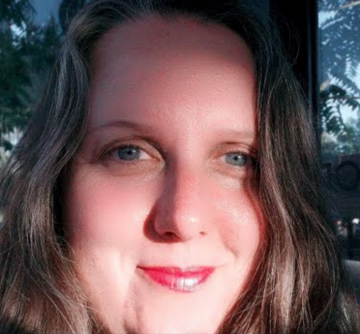The Stalker and the Writer
Monday, September 19, 2016
Theresa Griffin Kennedy, GoLocalPDX Contributor
 Becoming a writer and an author, one never really expects to attract a stalker; especially someone as ordinary, middle-aged and essentially boring as me—not to mention chubby and somewhat wrinkled. My glory days of being a cute 125 pound ballet student pixie with wide trusting blue eyes and a short brunette bob, sprinkled with orange highlights, are far behind me. But perhaps in this image/prestige/revenge obsessed world, attracting a stalker is the norm, or some sort of morbid seal of approval that you're on your way as an author or that you've “made it” somehow. How this odd dynamic has become a norm of any kind in American culture mystifies me.
Becoming a writer and an author, one never really expects to attract a stalker; especially someone as ordinary, middle-aged and essentially boring as me—not to mention chubby and somewhat wrinkled. My glory days of being a cute 125 pound ballet student pixie with wide trusting blue eyes and a short brunette bob, sprinkled with orange highlights, are far behind me. But perhaps in this image/prestige/revenge obsessed world, attracting a stalker is the norm, or some sort of morbid seal of approval that you're on your way as an author or that you've “made it” somehow. How this odd dynamic has become a norm of any kind in American culture mystifies me.
Back in 2005, when I was published for the first time, it was an insignificant letter to the editor regarding the memoir Running With Scissors, by popular author Augustine Burroughs. But the letter was published with Vanity Fair Magazine. I'll never forget the absolute thrill of looking through that thick, perfumed issue and finding my letter, with the words “PORTLAND, OREGON,” emblazoned under the text of my letter. Gazing down at my well-written letter in perhaps America's most popular magazine (and certainly my favorite magazine) provided me with all the self-validation I needed; I was hooked.
For years after that, I continued to doggedly write and submit, enduring the constant and predictable rejection that I never took personally, but just accepted as part of the process. During those years I was also raising a teen daughter, alone, and contending with continuous family obligations involving my disabled ex-husband and his complex needs. On top of that, I was completing a masters degree at Portland State University, which finally became a past-tense achievement following the Hooding Ceremony in 2013. I took special care to post anything I'd had published with a small local newspaper, magazine or literary review on the 2007 website I'd created for my writing. This included personal essays, articles on social justice, letters and poems. The website became a place where my work could be collected and stored for the enjoyment, I hoped, of the reading public and to demonstrate that I could, indeed write.
Imagine my surprise then, when a little over three years ago, while still immersed in the process of helping my then fiancée, Don DuPay, publish his nonfiction police story, Behind the Badge in River City: A Portland Police Memoir, I suddenly attracted a stalker. It happened so benignly that I didn't even notice. And it took me several months to see that this person's behavior was wrong. He is only, as the expression goes, an “on-line” stalker, but his behavior has still been disturbing and improper. He lives in India, is a translator and claims to work as a professor, there. His Facebook profile seems to support this.
Pretended to be Regular Facebook Friends
For several months he pretended to be just a regular Facebook friend. He “liked” my posts and politely complimented me on anything I might have published. Eventually, he asked if I would like to “collaborate” on a “book of poetry.” I knew he was a translator and professor who often translated poetry for Indian poets and I was intrigued. We chatted about this possibility for about a month, and eventually I could ascertain, as he would not provide concrete details, that he was not genuinely serious, and so I simply let the suggestion go.
Within only a couple of weeks of me no longer engaging with him regarding his evasive suggestion that we collaborate on the translation of a book, he began sending me flirtatious private messages. He told me how “beautiful” my blue eyes were and that he just “knew” by looking at photos of me that I was the kind of “virtuous woman” who would make a “good wife.” He began sending messages explaining that he wanted to meet. He asked if I would consider moving to India. I told him no, there was no way I would do that. During this time he also asked me repeatedly to set up a Skype account, so we could visit via video chats. Not being technically savvy and not knowing how, I begged off, explaining that I didn't know how to set up a Skype account. When he asked for my phone number, I told him I couldn't afford a cell phone and that my land-line did not have a long distance plan.
As we had messaged before about the possible collaboration on a book of poetry, there was the feeling that we were both writers, both on the same page so to speak, and so a particular detached familiarity had been achieved. As a result of this, I didn't see how I was slowly being manipulated. I never posted about any of this on my Facebook profile because the truth is, it was strangely embarrassing. I had never done anything intentional to induce this Indian man to become enamored of me. So, I continued, for a time, to deny how uncomfortable and confused I was starting to feel.
When he wrote me he was attempting to “pursue a residency” at a university in the states, in an effort to be closer to me, I was immediately alarmed. When I first read that particular message, I felt disturbed and angered. I wrote back, telling him I did not know him and he was a “virtual stranger” to me. His response showed me he couldn't understand what I was telling him, or better yet he was simply choosing to reject what I was trying to make very clear. I told him he needed to stop thinking there was any chance of us being together, for the reason that I was already in a relationship, as my Facebook profile clearly indicated. Once again, it was as if he couldn't understand the simple words I'd written.
He Insisited
When I wrote that I was going to be married in March 2013, he insisted after looking at several Facebook photos of my fiancée, Don DuPay, that Don was “too old” for me. He sent several messages that day in an effort to convince me that the marriage would be a mistake because of the age difference. I was busy that day and had a lot to do, so I ignored the messages until the next day. Upon rereading them, when I had the time, I grew to realize fully just how manipulative, inappropriate and disturbing this contact with him was becoming for me. And I could not help noticing a distinct change in his tone, which was becoming more urgent and sometimes even shrill. Moreover, I was insulted he would say disparaging things about the man I was in love with and engaged to marry. He had crossed a line with that and it offended me.
Ultimately, he was trying to create a false intimacy that did not exist and never would. When that realization finally hit me, like the proverbial TON of bricks, I took him off my friends list on the spot. I presumed by doing so, he would leave me alone, but he sent messages later that night. He seemed frantic and desperate that I'd removed him from my friends list and sent a flurry of messages begging me to accept his friend requests again, promising that he would be “respectful” from now on, and “only a friend.” I had stopped responding by now and because of these series of messages, each growing more hysterical, I blocked him—but only after calling my adult daughter on the phone and asking her how to do it.
In many ways I believe I was naïve of the dangers of social media and after a stern lecture from my daughter, I learned that Facebook and the Internet in general could be a very dangerous place. For a while after joining Facebook back in 2009, I had a public account but was soon told by my teen daughter that unless one was a journalist, newspaper person, or author, only “whores” had public profiles. She insisted, vehemently, that she allow me to change my status from public to private. I watched her smiling and grateful that she was on my side but wondering if perhaps she was over-reacting.
For more than three years I didn't hear from this man. Then about ten months ago, after the publication of two books, a crime book and a book of personal poetry, I created a Facebook Author's page. I figured it was about time. I was proud of my small accomplishments as a local Portland writer and author. It was time, I thought.
Now my on-line stalker has found my new Author's page. The first messages began appearing about a month ago. I never responded, but just read them for a few days and watched the tone continue to grow more insistent. He swore he was interested in “only friendship” but would message me at least six to eight times a day. He would often start each message by writing, “Hi. How are you?” or “Are you there? Can we talk?” Waking up in the morning and seeing the Facebook message “You have six new messages” or “You have eight new messages” was frustrating and thoroughly annoying. Reading messages that read, “I'm so eager to read your new book of poetry and to pray for you and your husband,” were becoming alarming in the bizarre social and cultural contradictions the language itself presented. So, this past week, I once again had to block this man, now from my Author's page.
What is it about our image/prestige/revenge obsessed world that promotes this brand of abnormal behavior, similar in nature to the personality disorder, Erotomania? Why do people do this? Why do they find more satisfaction in stalking a person, either on-line or in person, where true intimacy can never occur, than in finding someone in which to experience a real connection?
It makes the prospect of going forward with my writing projects and the books I'm working on far less enjoyable. And yet, this cannot stop me. And it won't.

2) Behind the Badge in River City: A Portland Police Memoir
3) Murder and Scandal in Prohibition Portland; Sex, Viced and Misdeeds in Mayor Baker's Reign

